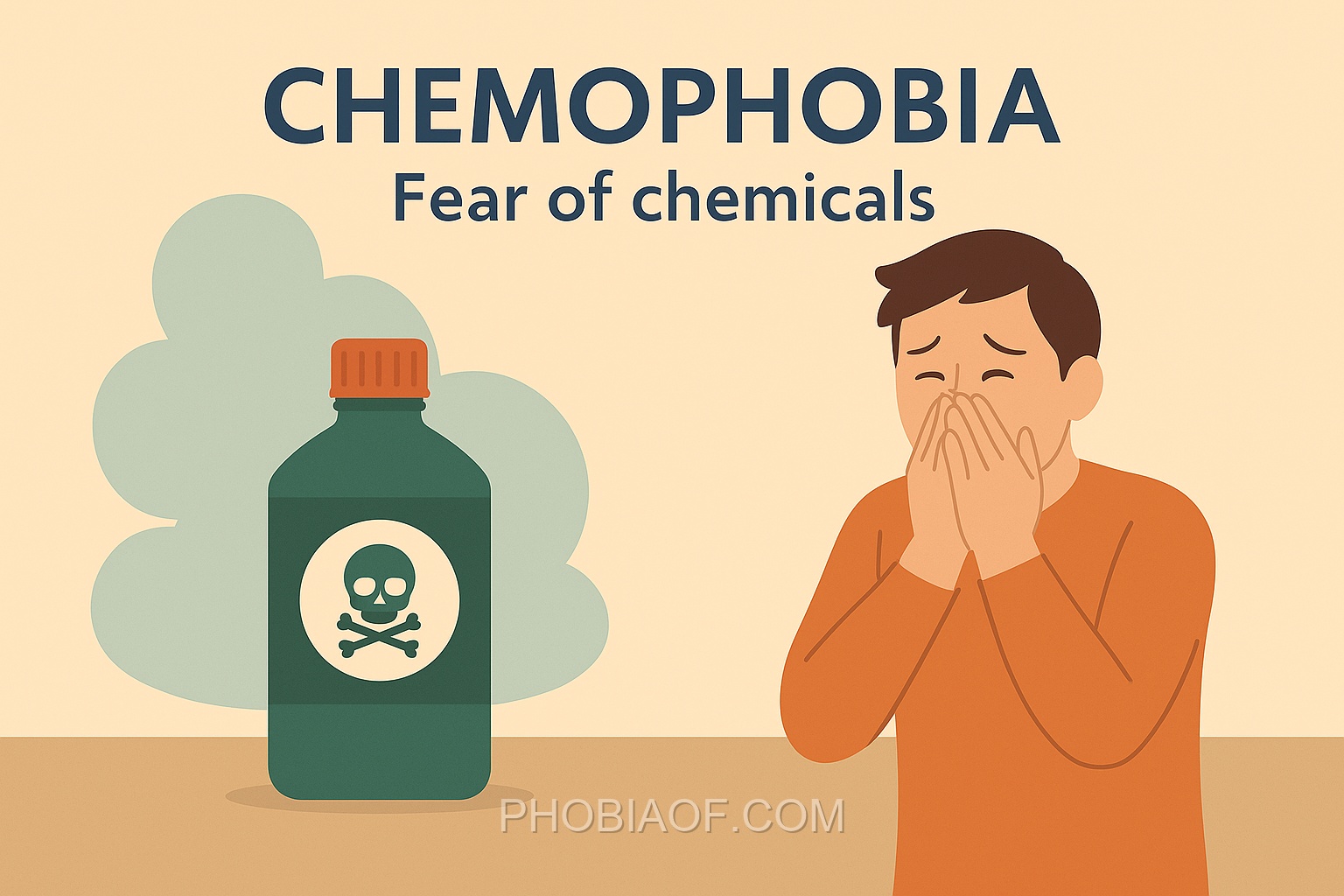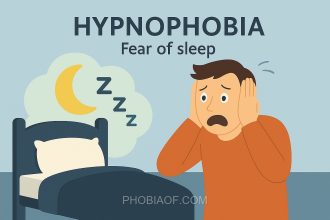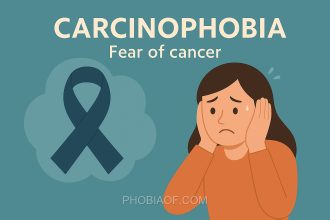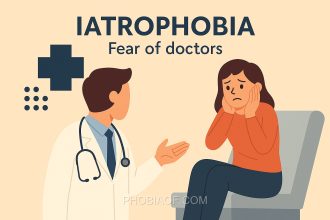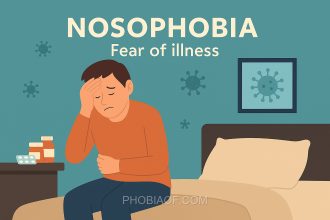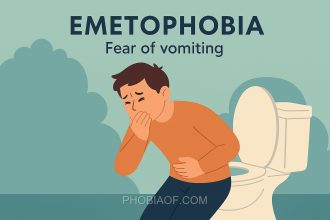Have you ever found yourself hesitating to use certain cleaning products or avoiding processed foods because of a fear of chemicals? If so, you might be experiencing chemophobia, a term that describes an intense fear or aversion to chemicals perceived as harmful or unnatural.
Chemophobia is derived from two parts: the Greek word “chemo,” meaning chemical, and “phobia,” meaning fear. This condition isn’t just about avoiding potentially dangerous substances; it often includes a fear of any chemical, regardless of its actual risk or benefit.
People affected by chemophobia may experience anxiety or stress when encountering products labeled with complex chemical names, even if those ingredients are common and safe. This fear can impact daily life, from the foods they choose to eat to the products they decide to use in their homes.
It’s important to approach this fear with understanding and empathy, recognizing that while some concerns about chemicals are justified, a blanket fear can limit choices and lead to unnecessary stress. By learning more about the nature of chemicals and their roles, individuals can make informed decisions without fear overshadowing their judgment.
Causes of Chemophobia
Chemophobia, the fear of chemicals, can arise from various causes. Understanding these causes can help in addressing the fear effectively. Below are some common reasons why someone might develop chemophobia:
- Genetic Predisposition: Some individuals may have a genetic tendency to develop phobias. This means that if a family member suffers from a specific phobia, others in the family might be more prone to experiencing similar fears.
- Traumatic Experiences: Exposure to a negative or harmful event involving chemicals, such as a spill or poisoning, can trigger a lasting fear. Even witnessing such an event can lead to chemophobia.
- Learned Behavior: Fear can be learned from observing others. If a person sees family members or peers express fear or caution around chemicals, they may adopt similar behaviors and attitudes.
- Psychological Factors: Anxiety disorders or a general tendency towards fearfulness can heighten the chances of developing chemophobia. People with a heightened sensitivity to risks may perceive chemicals as more dangerous than they are.
- Environmental Factors: Media reports and societal attitudes can influence perceptions of chemicals. Sensationalized news stories about chemical accidents or health risks may contribute to a heightened fear.
An interesting theory about the origins of chemophobia suggests that it may be linked to an evolutionary survival mechanism. This theory posits that humans have developed an innate caution towards unfamiliar substances as a way to avoid potential toxins.
Research into chemophobia continues to evolve, highlighting the complex interplay of various factors. By understanding these causes, individuals and professionals can better address and manage this fear, promoting a healthier relationship with chemicals in everyday life.
Symptoms of Chemophobia
Individuals experiencing chemophobia often face an intense fear or anxiety when encountering or even thinking about chemicals. This phobia can manifest in various physical, emotional, and behavioral symptoms. Recognizing these symptoms can be crucial for understanding and managing this condition effectively.
Common Physical Symptoms:
- Panic attacks, which may include a feeling of losing control or impending doom
- Excessive sweating, particularly when near perceived chemical sources
- Rapid heartbeat or palpitations
- Trembling or shaking
- Shortness of breath or a sensation of choking
- Dizziness or lightheadedness
- Gastrointestinal distress, such as nausea or stomach pain
Emotional and Behavioral Symptoms:
- Avoidance of places or situations where chemicals might be present, such as cleaning supply aisles or laboratories
- Overwhelming dread or worry about potential exposure to chemicals
- Obsessive thoughts about the harmful effects of chemicals
- Irritability or heightened sensitivity when discussing chemicals
- Difficulty concentrating due to pervasive anxiety about chemicals
When severe, these symptoms can significantly interfere with daily life, making it challenging to engage in routine activities or pursue certain careers and hobbies.
Treatment for Fear of Chemicals
It is completely understandable to feel apprehensive about chemicals, but it’s important to know that this fear, known as chemophobia, can be treated and managed effectively over time. With the right support and strategies, you can overcome this phobia and regain control over your life.
There are several proven therapies that have been successful in treating chemophobia:
- Exposure Therapy: This therapy involves gradually exposing yourself to the source of your fear in a controlled and safe manner. Over time, this can help reduce anxiety and desensitize you to the feared object or situation.
- Cognitive-Behavioral Therapy (CBT): CBT is designed to help you identify and change negative thought patterns that contribute to your fear. By altering these thoughts, you can reduce your anxiety and develop healthier coping mechanisms.
- Counseling: Speaking with a mental health professional can provide you with the support and guidance needed to navigate your phobia. Counseling offers a safe space to explore your fears and develop personalized strategies to overcome them.
In addition to therapy, there are several self-help coping techniques that can complement your treatment:
- Relaxation Exercises: Techniques such as deep breathing, progressive muscle relaxation, and visualization can help calm your mind and reduce anxiety.
- Meditation: Regular meditation practice can help increase your awareness and acceptance of your thoughts and feelings, promoting a sense of peace and control.
- Support Groups: Joining a support group can connect you with others who have similar fears. Sharing experiences and coping strategies can be incredibly empowering and reassuring.
In some severe cases, medication such as anti-anxiety medications might be considered. However, the focus should remain on therapy and coping skills, which offer long-term benefits without the potential side effects of medication.
Remember, seeking professional help is a strong and positive step if your phobia is interfering with your life. You don’t have to face this challenge alone, and with the right support, you can overcome chemophobia and move forward with confidence.
Conclusion
Understanding the causes and symptoms of chemophobia is a crucial step towards managing this often overwhelming fear. By recognizing the roots of the phobia, whether they stem from personal experiences or misinformation, individuals can begin to address their anxieties with more clarity and confidence.
Being aware of the symptoms allows individuals to take proactive measures in seeking support and developing coping strategies. It’s important to remember that many people successfully overcome or manage their phobias with time and proper assistance. Therapy, for instance, can provide valuable tools and techniques for confronting and reducing the fear of chemicals, while consulting a healthcare professional can offer guidance tailored to individual needs.
Remember: You are not alone in this journey. With determination and the right support, it is entirely possible to lead a life less burdened by chemophobia. Consider reaching out to a therapist or talking to a doctor if you feel overwhelmed. They can help you navigate the path to a more peaceful and informed relationship with the world of chemicals.
Stay hopeful and informed, and take the first step towards reclaiming control over your fears. Your journey towards understanding and managing chemophobia can empower you to live more confidently and comfortably in your environment.
